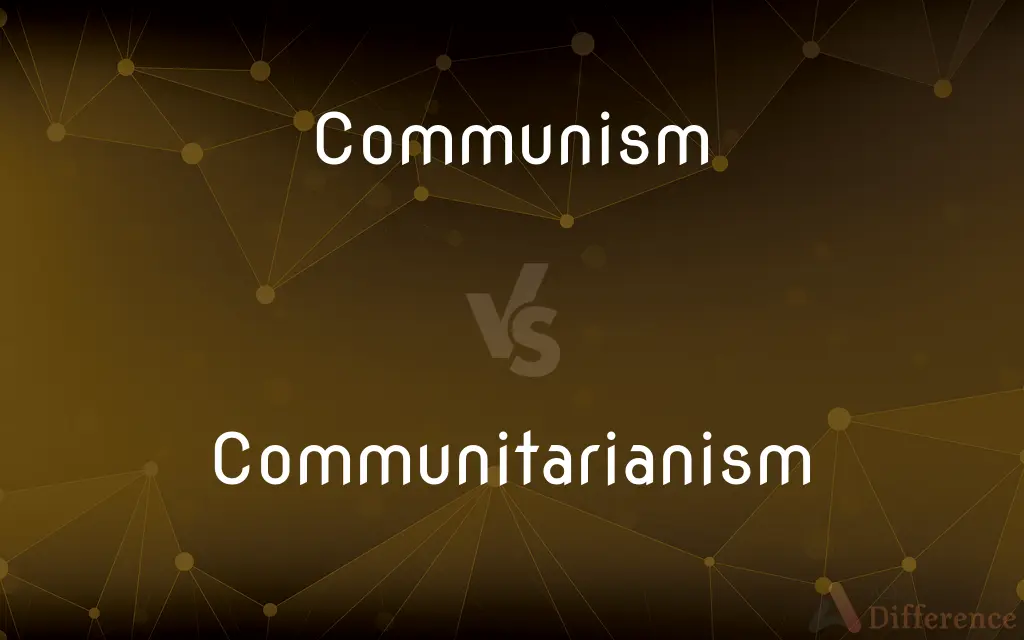Communism vs. Communitarianism — What's the Difference?
Edited by Tayyaba Rehman — By Fiza Rafique — Updated on March 28, 2024
Communism is political and economic ideology advocating for classless, stateless society & communal ownership of property. Communitarianism emphasizes importance of community values & social cohesion without advocating for the abolition of property.

Difference Between Communism and Communitarianism
Table of Contents
ADVERTISEMENT
Key Differences
Communism, rooted in Marxist theory, seeks to establish a society where all property is publicly owned, and each person works and is paid according to their abilities and needs. It aims for a classless, stateless society where the means of production are shared by all. On the other hand, communitarianism focuses on strengthening community bonds and moral, social, and cultural cohesion, advocating for a balance between individual rights and community responsibilities without necessarily altering the current capitalist system or abolishing private property.
While communism proposes significant changes to the economic system, including the abolition of private property and the redistribution of wealth, communitarianism does not seek to overhaul the economic system. Instead, it suggests reforms within the existing system to enhance community life and social welfare, emphasizing the importance of communal values and shared responsibilities.
Communism has been implemented in various forms around the world, often leading to the creation of socialist states that seek to progress toward a communist society. These implementations have been marked by attempts to redistribute wealth and eliminate class distinctions. In contrast, communitarianism is more of a philosophical or social theory than a political system, influencing policies that foster community engagement, social justice, and the enhancement of public spaces.
In practice, communism has faced criticism for leading to authoritarian regimes and economic inefficiencies in some cases, as seen in the 20th century. Communitarianism, while not a system of governance, offers critiques of both liberal individualism and authoritarian collectivism, proposing a middle ground that values community engagement and social responsibility.
The debate between communism and communitarianism also extends to the role of the state. Communism often involves a strong, centralized authority to transition society to communism, whereas communitarianism advocates for local governance and grassroots movements to strengthen community ties and decision-making.
ADVERTISEMENT
Comparison Chart
Core Idea
Classless, stateless society with communal ownership of property.
Emphasis on community values and social cohesion.
Economic System
Abolition of private property, redistribution of wealth.
Maintains private property, focuses on community welfare within the system.
Political System
Aims for a stateless society eventually; often involves strong state control initially.
Advocates for local governance and grassroots democracy.
Implementation
Implemented as a political and economic system in various countries.
Applied as a social philosophy influencing policies and community practices.
Criticism & Challenges
Criticized for authoritarian regimes, economic inefficiencies.
Faces challenges in balancing individual rights with community responsibilities.
Compare with Definitions
Communism
Often involves centralized planning and control.
Communism has historically been associated with strong state mechanisms.
Communitarianism
Prioritizes community values and social cohesion.
Communitarianism stresses the importance of community service and engagement.
Communism
A system aiming for a classless society and communal ownership.
In communism, factories and farms are owned collectively.
Communitarianism
Advocates for local governance and participation.
Communitarianism encourages active involvement in local councils and groups.
Communism
Aims to eliminate private property.
Under communism, individual ownership of businesses would be abolished.
Communitarianism
Balances individual rights with community responsibilities.
In communitarianism, personal freedoms are aligned with social obligations.
Communism
Advocates for wealth redistribution according to need.
Communism seeks to ensure that wealth is shared among all citizens.
Communitarianism
Critiques both extreme individualism and collectivism.
Communitarianism seeks a middle path that values both individual and community.
Communism
Focuses on international solidarity.
Communism emphasizes unity and cooperation across national boundaries.
Communitarianism
Influences policies for public space and social welfare.
Communitarian policies might support public parks and community centers.
Communism
Communism (from Latin communis, 'common, universal') is a philosophical, social, political, and economic ideology and movement whose ultimate goal is the establishment of a communist society, namely a socioeconomic order structured upon the ideas of common ownership of the means of production and the absence of social classes, money, and, in some cases, the state. As such, communism is a specific form of socialism.
Communitarianism
Communitarianism is a philosophy that emphasizes the connection between the individual and the community. Its overriding philosophy is based upon the belief that a person's social identity and personality are largely molded by community relationships, with a smaller degree of development being placed on individualism.
Communism
A theoretical economic system characterized by the collective ownership of property and by the organization of labor for the common advantage of all members.
Communitarianism
(ethics) The group of doctrines that oppose excessive individualism in favour of a more community-based approach
Communism
A system of government in which the state plans and controls the economy and a single, often authoritarian party holds power, claiming to make progress toward a higher social order in which all goods are equally shared by the people.
Communism
The Marxist-Leninist doctrine advocating revolution to overthrow the capitalist system and establish a dictatorship of the proletariat that will eventually evolve into a perfectly egalitarian and communal society.
Communism
Any far-left political ideology or philosophy advocating holding the production of resources collectively, especially by seizing it through revolution.
Communism
Any political social system that implements a communist political philosophy.
Communism
The international socialist society where classes, money, and the state no longer exist.
Communism
A scheme of equalizing the social conditions of life; specifically, a scheme which contemplates the abolition of inequalities in the possession of property, as by distributing all wealth equally to all, or by holding all wealth in common for the equal use and advantage of all.
Communism
A form of socialism that abolishes private ownership
Communism
A political theory favoring collectivism in a classless society
Common Curiosities
What is communism?
Communism is a political and economic ideology aiming for a classless society with communal ownership of property.
Can communitarianism be considered a political system?
Communitarianism is more of a social philosophy than a political system, though it influences policies that foster community engagement and social justice.
What is communitarianism?
Communitarianism is a philosophy that emphasizes community values, social cohesion, and balancing individual rights with community responsibilities.
How have communist societies historically differed from the ideals of communitarianism?
Communist societies have often involved strong state control and attempts to redistribute wealth, while communitarianism focuses on grassroots democracy and community values without necessitating major economic system overhauls.
How do communism and communitarianism differ in their view on property?
Communism advocates for the abolition of private property, while communitarianism maintains private property, focusing on enhancing community welfare.
Is communitarianism compatible with capitalism?
Yes, communitarianism seeks to reform and improve capitalism by emphasizing community values and social welfare within the existing system.
What criticisms does communism face?
Communism has been criticized for leading to authoritarian regimes, economic inefficiencies, and the suppression of individual freedoms in some cases.
What role does the state play in communism versus communitarianism?
In communism, the state often plays a significant role in transitioning society to communal ownership, while communitarianism advocates for local governance and grassroots involvement without a centralized authority.
How does communitarianism propose to improve society?
Communitarianism proposes improving society through local governance, community engagement, and policies that foster social welfare and public spaces.
Can communitarian principles influence global policies?
Yes, communitarian principles can influence global policies by promoting international cooperation based on community values and social responsibility.
What challenges does communitarianism face in implementation?
Communitarianism faces challenges in balancing the needs of the community with individual freedoms and navigating local versus national interests.
Has communitarianism been implemented in specific countries?
While not a political system, communitarianism influences social policies and community practices in various countries, focusing on strengthening community ties.
How do communism and communitarianism address social welfare?
Communism addresses social welfare through the redistribution of wealth and communal ownership, while communitarianism focuses on community-based initiatives and policies within the existing economic system.
What are the main goals of communitarianism?
The main goals of communitarianism are to strengthen community bonds, enhance social and cultural cohesion, and balance individual rights with community responsibilities.
Do communism and communitarianism share any common goals?
Both ideologies aim to improve societal welfare and cohesion, though they differ significantly in methods, views on property, and the role of the state.
Share Your Discovery

Previous Comparison
Soiree vs. Fete
Next Comparison
Provider vs. SupplierAuthor Spotlight
Written by
Fiza RafiqueFiza Rafique is a skilled content writer at AskDifference.com, where she meticulously refines and enhances written pieces. Drawing from her vast editorial expertise, Fiza ensures clarity, accuracy, and precision in every article. Passionate about language, she continually seeks to elevate the quality of content for readers worldwide.
Edited by
Tayyaba RehmanTayyaba Rehman is a distinguished writer, currently serving as a primary contributor to askdifference.com. As a researcher in semantics and etymology, Tayyaba's passion for the complexity of languages and their distinctions has found a perfect home on the platform. Tayyaba delves into the intricacies of language, distinguishing between commonly confused words and phrases, thereby providing clarity for readers worldwide.














































